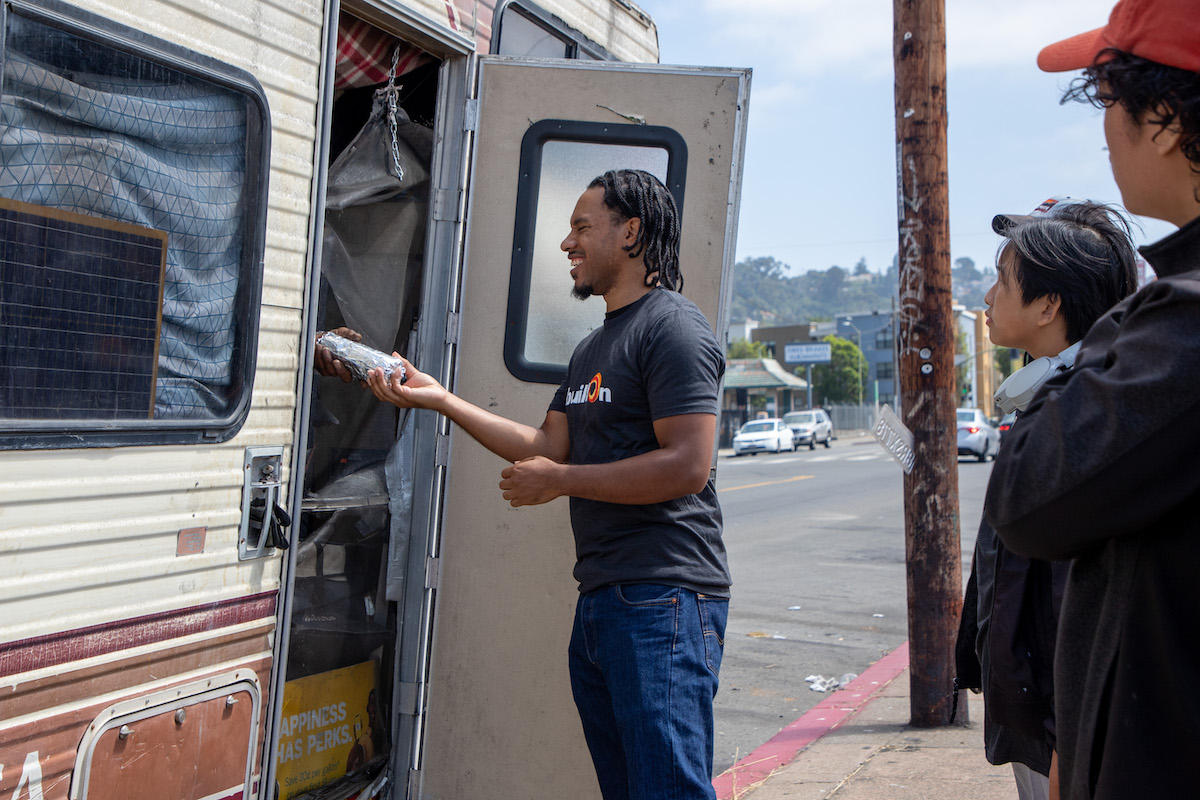Hip-hop blasted from a DJ’s PA speakers in a parking lot at 78th Avenue and Macarthur Boulevard early on a recent Saturday morning. The music was to energize a crowd of over 250 people who had gathered with a single purpose in mind: to feed Oakland’s food-insecure and unhoused.
East Oakland resident Joe Schramm called the scene “beautiful chaos.” This was Schramm’s fourth year volunteering at “Feed the Hood.”
“It’s a really great way to actually feel like you’re a part of the community,” he said. “It’s one of the great things about Oakland.”
Last Saturday marked the 26th Feed the Hood—a quarterly event organized by the Oakland-based non-profits The East Oakland Collective and Community Kitchens. Volunteers prepare lunches, snack packs, and hygiene kits, and distribute them in caravans to Oakland’s unhoused populations.
The goal of the event is lofty: to prepare and distribute 2,000 meals in a matter of hours. But it’s more than just a day of work. Folks walking by curiously trickle in, some for food, others to join in the groups of people dancing and talking.

This was also the third year in which Feed the Hood has been dedicated to Shock G, the famous rapper and member of the Oakland-based group, Digital Underground, who passed away in 2021.
In addition to being the lead vocalist of Digital Underground, known for hit singles like “Same Song,” and “The Humpty Dance,” Shock G is celebrated by his loved ones for his commitment to service.
Digital Underground partnered with The Collective on Feed the Hood in 2021, and several of its members, like Oakland’s Grammy-nominated artist Mystic, showed up to pack bags and mingle.
“Shock would give you the coat off his back, he would take people who were part of our unhoused community, get them hotel rooms, bring them food,” Mystic said. “Doing Feed the Hood is really about honoring Shock’s legacy through service and it’s also about honoring the continuum of service that has long existed in Oakland.”

Community Kitchens, which works with a network of BIPOC-owned restaurants to serve hot meals to food-insecure Oaklanders, has been partnering with The East Oakland Collective on Feed the Hood since 2020. This year, they worked with ten local restaurants, including Ethiopian favorite Mela Bistro and East Oakland-based Lena’s Soul Food. Their mission statement, “meals with dignity,” ensures that unhoused individuals are served the same food that their restaurant partners would serve customers. Community Kitchens pays $11 for each meal. On the menu are items like catfish and collard greens, burritos, teriyaki chicken, homemade chocolate chip cookies, and more.
“With food justice, it’s not just about providing a meal,” said Maria Alderete, the executive director and co-founder of Community Kitchens. “For us, it’s providing a meal with dignity. It’s a meal that we ourselves would eat.”


Community Kitchens works mostly in East and West Oakland, where food insecurity rates are higher than in other parts of the city. Alderete noted that the Eastmont neighborhood, where The East Oakland Collective is located, has twice the poverty rate as the national average and over 50% of households in the neighborhood are food insecure.
Community Kitchens and The East Oakland Collective bring food to encampments rather than asking unhoused people to travel to obtain a meal, in recognition of the difficulty unhoused individuals may face with transportation.
“If you’re unhoused in East Oakland, you’re going to have to walk three to five hours just to access food,” Alderete said. She noted that the closest soup kitchen, St. Vincent de Paul, is located in West Oakland. “What we’re trying to do is bring people the food where they’re at so that they can spend that time that they would otherwise spend accessing food, helping to improve their lives.”
Community Kitchens uses a mini school bus, painted red, yellow, and blue, and fit with speakers on the exterior, to make deliveries in style. The bus, called the “Mobile Oasis,” is one of six cars joining the caravan, each traveling on a set route to various encampments.

A caravan also set out on foot, pulling wagons full of hot meals and supplies like toilet paper, razors, soap, and feminine hygiene products. The group was led by another community partner, the non-profit organization Build On, which works with Oakland High School and other schools to get students involved in community service. Six high schoolers passed out burrito bowls, snacks, and toilet paper to folks living in cars, RVs, and in tents near the Eastmont Mall.
Recipients were particularly excited about the teriyaki chicken, asking if they could take enough to share with their friends and instructing members of the caravan on where to go next.
“The community coming together is a beautiful thing to see,” said Joshua Gaines, Build On’s student engagement specialist.
The next Feed the Hood takes place in December and anyone can sign up to volunteer, but registration is not yet open. In the meantime, the East Oakland Collective hosts a weekly food distribution event. Additionally, Community Kitchens distributes food in West Oakland on Tuesdays and East Oakland on Thursdays. And Digital Underground will continue to partner each year with The Collective to carry on the union of culture and service in Oakland.
“The work that we do here coming together on this day is not only through service to continue the legacy of our brother and our mentor Shock G, but it’s to continue on the pathway that has been laid out for us by the Black Panthers and by brown folks who are doing organizing work,” Mystic said. “Feeding people is revolutionary.”

